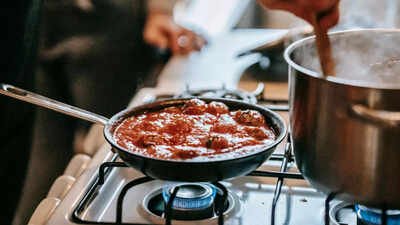
So, what’s the plan tonight? Dining out or ordering in? Well, then it’s time to rethink your choice. No, not what you are planning to eat, but how it’s made. Leading health experts recommend turning your stove on, and there is a solid reason behind it. Researchers from the University of Washington School of Public Health found that cooking at home could be more beneficial than you think. The findings of the study are published in the American Journal of Preventive Medicine.
How the food is made matters as much

Cooking at home tonight? It’s likely cheaper and healthier. Yes, that’s right. The researchers found that people who cook at home more often are likely to eat a healthier overall diet.“By cooking more often at home, you have a better diet at no significant cost increase, while if you go out more, you have a less healthy diet at a higher cost,” Adam Drewnowski, director of the UW’s Center for Public Health Nutrition and senior author, said. The study is titled “Cooking at home: A strategy to comply with U.S. dietary guidelines at no extra cost.”
Healthy Eating Index
How do you know if your eating pattern is healthy? With the help of the Healthy Eating Index. It is a measurement used to define a healthy diet. This index measures whether a person’s diet is giving them the right combination of fruits, vegetables, and other elements.
The study

To understand the impact of how food is made on health, the researchers interviewed 437 King County adults. In the Seattle Obesity Study, the participants were asked to remember their last week of eating in and eating out. The researchers supervised the adults answering a questionnaire, with detailed sections on what they ate and where.They found that home-cooked dinners were associated with a ‘greater dietary compliance.’ This means the overall weekly diet met more of the federal guidelines for a healthy diet. The study showed that households that cooked at home about three times per week had a score of about 67 on the Healthy Eating Index. Those who cooked at home about six times per week had a score of about 74.“The differences were significant, even with a relatively small study sample,” Drewnowski, also a professor of epidemiology, said.
Time poverty
Well, you don’t have to feel bad if you can’t cook at home every night, the researchers understand. Drewnowski noted that some people in the United States suffer from what epidemiologists call ‘time poverty.’ Yes, that’s a legit term. Roughly half of all food dollars in the United States are spent on eating out. This suggests that cooking at home is not really feasible for a large part of the population.
Health nutritionists suggest that efforts to promote cooking at home should be balanced with efforts to encourage retailers and restaurants to offer healthy, less expensive prepared foods for easy purchase outside of the home.Some measures of food consumption are dependent on calories instead of dollars. According to the study, the number of calories from eating out has risen from 18 percent in the 1970s to 32 percent by the late 1990s.
Why cooking at home is best for you

Only 1 in 5 Americans meet the dietary guidelines set by the U.S. Dept of Agriculture. Surprisingly, the researchers also found that there was no increase in costs for eating a healthier diet. Home-cooked meals were not only lower in calories, sugar, and fat. Well, the best part is also the fact that healthy eating won’t cost you an arm and a leg. The study also found that there was no link between income or education when it comes to eating at home or eating out. “People have the preconception that a lower income leads to eating more fast food, but that was not true in our study. People who cooked more often at home were likely to have larger households with more children in them,” Drewnowski said.The researchers emphasized that being healthier doesn’t cost more.






